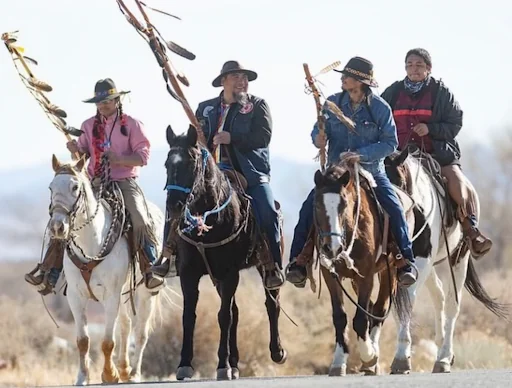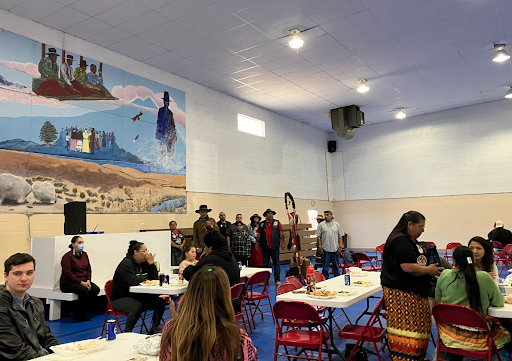|
Getting your Trinity Audio player ready...
|
Nevada is at the frontlines of a national rush to mine lithium. As we work to mitigate climate impacts that play out on a global scale, Indigenous communities in Nevada are raising awareness that we must also address the regional environmental and cultural destruction mining creates.
In March of 2024, Joshua Dini, a Walker River Paiute Tribal member, rode many miles on horseback with a group of other land protectors in prayer. They prayed for health and a clean environment for all people in light of the new mining rush. The ride traversed over 230 miles through Northern Nevada, starting in Dini’s hometown of Shurz and ending at Peehee Mu’huh, also known as Thacker Pass.

This was the third year of the Prayer Horse Ride. All along the path the riders stopped to visit Tribes and shared hope, prayer, and education. Through traveling to neighboring communities and educating, Dini is continuing the work of his late brother, indigenous journalist and land protector Myron Dewey, though the tradition of unity, prayer, and moving on the land goes much farther back.
“The government set up these reservations to bring divisions within our people,” Dini said. “The goal for this Prayer Horse Ride is to ride in a vision of our ancestors to bring prayer, healing, and unity. It is reminding the people to look past those boundaries, remembering we didn’t have these boundaries, we welcomed and supported each other’s families.”
The Prayer Horse Ride started in response to the Thacker Pass Mine, a lithium mine being constructed in a sacred landscape known as Peehee Mu’huh. The name translates to rotten moon and references two massacres that took place at the pass. The most recent massacre was an act of the US federal government as efforts were made to open western lands for mining and ranching.
This prayer ride comes at an important moment to remind people that work to protect Peehee Mu’huh is not based on the outcome of a federal lawsuit. Last year, the ninth circuit ruled that the BLM violated the law in permitting the Thacker Pass mine, yet broke from judicial precedent in not vacating the permit as a result, allowing the project to move forward. Federal courts also ruled against regional Tribes who sued the BLM for failure to adequately consult with them on the project.
“We go through a court system that is not made for us,” Dini said. “I am going to continue to go up to those lands and stand with my family that are up there praying to protect this land. There can be a miracle when things turn around. That was part of our prayer this year; for a shift. We look at Thacker Pass, but there is also Jindalee and other mines coming in. If we can shift those, then that is a victory.”
For those like Dini working to protect these lands, it is no longer just about the Thacker Pass Mine; companies have proposed a number of additional mines throughout the McDermitt Caldera, a lithium-rich geological feature in Northern Nevada and Southern Oregon. Peehee Mu’huh is at the southern end of the caldera which extends roughly 28 miles to the north and is 22 miles from east to west. Activists and Tribes in the region are working to prevent the caldera from becoming a sacrifice zone.

The Jindalee project , at the northern end of the caldera, underwent an environmental assessment for expanded exploratory drilling last year and is moving towards mine permitting.The Aurora project, also on the Oregon side, is also progressing through exploration. The proponents of this mine are planning to produce uranium in addition to lithium. Both of these projects are on public lands and will be subject to the National Environmental Policy Act (NEPA), the federal law that requires the Bureau of Land Management (BLM) to consider the social and environmental impacts of a proposed project on federal lands. NEPA will include the opportunity for participation through public comment.
Despite being permitted, there are still impacts from the Thacker Pass Mine that warrant public participation. The mine could significantly harm sensitive species and crucial habitat. Opportunities to better protect species and habitat are ongoing, even with mine construction underway.
The Kings River pyrg is an endemic spring snail only found at Peehee Mu’huh. There are currently efforts led by Western Watersheds to secure emergency endangered species act listing for the Kings River pyrg. In 2024, the US Fish and Wildlife Service accepted Western Watershed’s petition and determined that the issue warranted a formal 12-month listing status review.
Another sensitive species, the Sage Grouse, also depends on the area in and around Thacker Pass. It is well known that the high desert sagebrush ecosystem found throughout the McDermitt Caldera is crucial to sensitive Sage Grouse populations. The BLM published a Draft Environmental Impact Statement on updating Sage Grouse management for comment in March, 2024.
“We don’t stop because we lose two lawsuits,” Dini said. “We’ve been losing fights for 500 years, but we keep fighting and we keep praying.”
Dini and the other riders are carrying on an old tradition of Indigenous stewardship, though they have also forged relationships with non-native supporters. Not just in Nevada, but across the globe, Indigenous communities are on the frontlines of increased interest in mining to support the energy transition.

Earthworks attended the start of the ride in Shurz, NV where we were honored to share perspective on a panel discussion focused on the impacts of mining to Indigenous Peoples and the pressing need for mining law reform.
In the United States, the 1872 General Mining Act, enacted over 150 years ago, still governs hardrock mining. Part of Earthworks’ mission that aligns with the work of the Prayer Horse Riders is to reform the federal mining law to better protect other land uses such as sacred sites from the harmful effects of mining.
On the riders’ first stop in Yerrington, NV, a local mining watchdog non-profit Great Basin Resource Watch provided a mining impact 101 workshop. There is no right to say no to a mine in federal mining law.
“Working with other organizations is great because they have different knowledge and connections to help us with the legal stuff in addition to the cultural work,” Dini said. “This is not just an Indigenous issue, it is a human issue. It is human survival because now the water is going to be contaminated and there will be bad air that is going to hurt all of our health.”
Dini explained that in light of current tensions between Indigenous land protection and mining for electric vehicle battery minerals, federal reforms and/or new policies are needed.
“We should be able to be at the table to help make policies that will protect us as much as possible,” he said.
You can support these efforts to protect the Caldera and stay up to date by following People of Red Mountain, Great Basin Resource Watch, and Earthworks.
